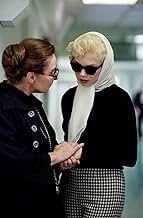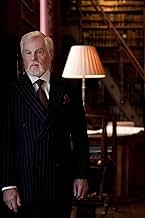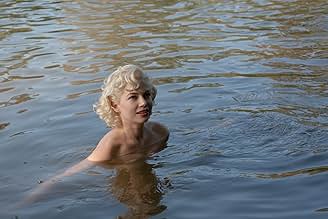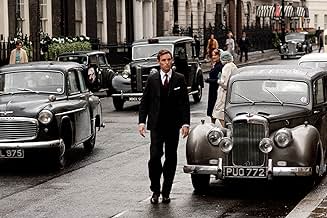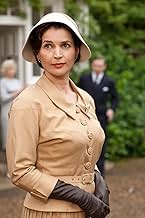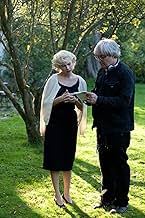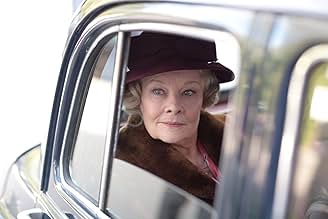AVALIAÇÃO DA IMDb
6,9/10
91 mil
SUA AVALIAÇÃO
Colin Clark, um funcionário de Sir Laurence Olivier, documenta as tensas interações entre Olivier e Marilyn Monroe durante a produção de O Príncipe Encantado (1957).Colin Clark, um funcionário de Sir Laurence Olivier, documenta as tensas interações entre Olivier e Marilyn Monroe durante a produção de O Príncipe Encantado (1957).Colin Clark, um funcionário de Sir Laurence Olivier, documenta as tensas interações entre Olivier e Marilyn Monroe durante a produção de O Príncipe Encantado (1957).
- Direção
- Roteiristas
- Artistas
- Indicado a 2 Oscars
- 18 vitórias e 64 indicações no total
- Direção
- Roteiristas
- Elenco e equipe completos
- Produção, bilheteria e muito mais no IMDbPro
Avaliações em destaque
This movie would have been better if they had made it about a fictional actress based on Monroe instead of about Monroe herself.
The Goddess, filmed during Monroe's lifetime (around the time this movie is set, in fact) couldn't have used her name, and it's much the better for that constraint. The Goddess doesn't constantly force us to compare Kim Stanley's fantastic performance with the real Marilyn Monroe, because it doesn't constantly CALL her Marilyn Monroe. My Week with Marilyn doesn't give us that freedom, the freedom to appreciate Michelle Williams's performance on its own merits rather than as an impersonation of a much more charismatic and distinctive star than she is herself.
Viewers more familiar with Williams than with Monroe can rave about this performance, because they're not comparing it to anything. To them, Monroe is just a dizzy blonde standing over a subway grate with her skirt billowing up around her, and Williams plays THAT role as well as anyone else could. But she can't for one second deceive anybody who has experienced Monroe (seeing her is only part of the delight) in more than one scene from one movie.
Half of Monroe's power as a performer is in her face, one of the most beautiful and naturally expressive faces God ever made, and that's why NO actress can EVER successfully play her. No one else has that face.
Using a fictitious name would also have relieved them of having to portray the insufferably shallow and narcissistic Laurence Olivier, the most overrated actor who ever lived. I realize that they based this movie on Colin Clark's highly dubious and self-aggrandizing "memoirs" of his brief contact with Monroe, and therefore had some justification for their choices, but that was a mistake.
One of many mistakes. Worst: the stupid screenplay, which treated Clark's adolescent fantasy as truth and made it even more ludicrous than it already was. Second: the hackneyed direction that makes a story about interesting and real people seem as false as a soap opera. Third: the miscasting of every role in the movie.
Although the most egregiously miscast are Dougray Scott as Arthur Miller, Dominic Cooper as Milton Greene, and plodding Julia Ormond as ethereal Vivien Leigh, NONE of the actors convincingly portray the real persons they are supposed to be. Even Judi Dench is maudlin and icky as the decidedly UN-maudlin and UN-icky Sybil Torndike. I suppose Branagh is sufficiently pretentious and boring as Olivier, but the movie would have been better without that character.
The one good thing about this movie is that it calls attention to Marilyn Monroe. If it had motivated even one person who'd never done so to watch her movies, it would have been worthwhile.
The Goddess, filmed during Monroe's lifetime (around the time this movie is set, in fact) couldn't have used her name, and it's much the better for that constraint. The Goddess doesn't constantly force us to compare Kim Stanley's fantastic performance with the real Marilyn Monroe, because it doesn't constantly CALL her Marilyn Monroe. My Week with Marilyn doesn't give us that freedom, the freedom to appreciate Michelle Williams's performance on its own merits rather than as an impersonation of a much more charismatic and distinctive star than she is herself.
Viewers more familiar with Williams than with Monroe can rave about this performance, because they're not comparing it to anything. To them, Monroe is just a dizzy blonde standing over a subway grate with her skirt billowing up around her, and Williams plays THAT role as well as anyone else could. But she can't for one second deceive anybody who has experienced Monroe (seeing her is only part of the delight) in more than one scene from one movie.
Half of Monroe's power as a performer is in her face, one of the most beautiful and naturally expressive faces God ever made, and that's why NO actress can EVER successfully play her. No one else has that face.
Using a fictitious name would also have relieved them of having to portray the insufferably shallow and narcissistic Laurence Olivier, the most overrated actor who ever lived. I realize that they based this movie on Colin Clark's highly dubious and self-aggrandizing "memoirs" of his brief contact with Monroe, and therefore had some justification for their choices, but that was a mistake.
One of many mistakes. Worst: the stupid screenplay, which treated Clark's adolescent fantasy as truth and made it even more ludicrous than it already was. Second: the hackneyed direction that makes a story about interesting and real people seem as false as a soap opera. Third: the miscasting of every role in the movie.
Although the most egregiously miscast are Dougray Scott as Arthur Miller, Dominic Cooper as Milton Greene, and plodding Julia Ormond as ethereal Vivien Leigh, NONE of the actors convincingly portray the real persons they are supposed to be. Even Judi Dench is maudlin and icky as the decidedly UN-maudlin and UN-icky Sybil Torndike. I suppose Branagh is sufficiently pretentious and boring as Olivier, but the movie would have been better without that character.
The one good thing about this movie is that it calls attention to Marilyn Monroe. If it had motivated even one person who'd never done so to watch her movies, it would have been worthwhile.
Here's the thing: knowing this is going to be about Marilyn, we expect certain things. Dazzling beauty exuding sex, insecure film star in search of the real person; perhaps some eye-popping excess about the business responsible for fabricating our dreams. And we expect these because Marilyn's story is Hollywood lore at its most pure: a pretty picture masking darkness of all sorts.
So because we already know that Marily was not just a sparkling movie star and because this is all so widely familiar and with its own widely referenced myth and iconography, the only reason to make this into a film is that you have come up with some unique angle that sheds new unexpected light into the thing. A structure that can hold together so many cinematic dreams implicit by having at the center this woman who gave flesh to them.
At least the premise is sound, if not remarkable. A young man has written a book about his short time together with her, and on a movie set. We trust that a lot of that is fictional and doctored, itself not far from a movie script. Ideally, our film has the option of conflating personal recollection, diary, rehearsal, film being made, into our film about the fabrication of myths and an actress looking to understand the real person behind the role she's given to play.
The first half holds. A breezy, sparkling, leisurely stroll around a movie set, as we like to imagine must have been everyday life around movie stars. We bask in the radiance of making movies and play-acting. What better life?
In the second half however we expect to know the other side of the idealized image. Sex as no longer delicious eye-candy but baring the soul naked.
What do we get instead? That same stereotyped image attached to a score of movie clichés: tabloid proclamations, banality, hackneyed emotion diffused into TV soap. We know that Marilyn and this world was more complex than this. Gentlemen preferred the blonde for a reason and the film does not even begin to understand why.
So because we already know that Marily was not just a sparkling movie star and because this is all so widely familiar and with its own widely referenced myth and iconography, the only reason to make this into a film is that you have come up with some unique angle that sheds new unexpected light into the thing. A structure that can hold together so many cinematic dreams implicit by having at the center this woman who gave flesh to them.
At least the premise is sound, if not remarkable. A young man has written a book about his short time together with her, and on a movie set. We trust that a lot of that is fictional and doctored, itself not far from a movie script. Ideally, our film has the option of conflating personal recollection, diary, rehearsal, film being made, into our film about the fabrication of myths and an actress looking to understand the real person behind the role she's given to play.
The first half holds. A breezy, sparkling, leisurely stroll around a movie set, as we like to imagine must have been everyday life around movie stars. We bask in the radiance of making movies and play-acting. What better life?
In the second half however we expect to know the other side of the idealized image. Sex as no longer delicious eye-candy but baring the soul naked.
What do we get instead? That same stereotyped image attached to a score of movie clichés: tabloid proclamations, banality, hackneyed emotion diffused into TV soap. We know that Marilyn and this world was more complex than this. Gentlemen preferred the blonde for a reason and the film does not even begin to understand why.
Marilyn Monroe, the quintessential blonde bombshell, came to Pinewood Studios in 1956 to shoot 'The Prince and the Showgirl', a light comedy directed by and starring Laurence Olivier. Colin Clark, the third assistant director on the film, was the lucky 23-year-old who got to spend a week with her. 'My Week with Marilyn' cinematises his diary.
I imagine there aren't many characters more difficult to play than Monroe. It must be like playing Elvis. But I'm delighted to confirm that Michelle Williams makes the impossible look easy. She has thrown herself into this part and has nailed the portrayal. Aside from the physical resemblance, Williams walks, talks and acts like Monroe. It's too early to say whether she'll win the Oscar next year, but a nomination seems a certainty.
Williams' performance is bolstered by impeccable turns by an enviable roster of the creamiest cream of British talent: Judi Dench, Kenneth Branagh, Zoë Wanamaker, Eddie Redmayne and Emma Watson. Especial mention must go to Branagh whose Olivier is impeccable. He accurately displays the legendary actor's sophistication and scurrility, and is bound to receive a supporting Oscar nod.
I loved the film's playfulness, for instance when Clark takes Monroe on a tour of Eton, followed by skinny-dipping in a cold river. The filmmakers do well to capture the craziness of Marilyn's world and the feeling of what it was like to be the most famous woman in the world. There are some lovely little touches – like the scene where Clark asks Monroe why she has a picture of Abe Lincoln by her bedside. Her reply, 'I don't know who my real father was, so why not him?'.
Eddie Redmayne, who has appeared in some big films ('The Good Shepherd', 'Elizabeth: The Golden Age') is well-cast as Colin Clark. Perhaps it's because he looks so much the underdog. He sort of represents every young man who would have killed to be in his shoes.
Clark has his eyes set on Monroe but resigns himself to the fact that Emma Watson's character, a costume assistant, is more his match. A weakness in the story, although I'm unclear of the veracity, is how underused Watson is and how readily she forgives his liaison with Monroe. Didn't girls have higher standards in those days?
Simon Curtis is yet another Englishman who has moved seamlessly from TV to cinema. His film astutely plays down the fact that Colin was brother to the even more famous Alan Clark, a former Conservative MP. Rightly so, I think. This film isn't about the minister or his also-famous diaries.
I'm glad the filmmakers didn't sacrifice the film's integrity by moulding it to be rated 12A (British certificate) to increase ticket sales. The two or three flashes of flesh are not only welcome, they are vital (Monroe said that 'the body is meant to be seen'). Curtis teases us like Marilyn was famous for doing. But he knows not to go too far by showing us any more than is necessary.
In summary, this is a brilliant biopic, as well as a story of what happened when a young man got close to the star he adored. It is bittersweet and evocative of a golden age of Hollywood. I was made to care for Monroe. I felt bad for her when she was exploited. Along with Elton John's beautiful song, this film has made me understand Norma Jeane Mortenson a little better. Now I see her as more than a sex symbol. She may have been blonde but she wasn't dumb. Dumb blondes don't read James Joyce or marry Arthur Miller, or come out with some of the wittiest lines a person can utter. She was like all of us, really: a human being.
www.moseleyb13.com
I imagine there aren't many characters more difficult to play than Monroe. It must be like playing Elvis. But I'm delighted to confirm that Michelle Williams makes the impossible look easy. She has thrown herself into this part and has nailed the portrayal. Aside from the physical resemblance, Williams walks, talks and acts like Monroe. It's too early to say whether she'll win the Oscar next year, but a nomination seems a certainty.
Williams' performance is bolstered by impeccable turns by an enviable roster of the creamiest cream of British talent: Judi Dench, Kenneth Branagh, Zoë Wanamaker, Eddie Redmayne and Emma Watson. Especial mention must go to Branagh whose Olivier is impeccable. He accurately displays the legendary actor's sophistication and scurrility, and is bound to receive a supporting Oscar nod.
I loved the film's playfulness, for instance when Clark takes Monroe on a tour of Eton, followed by skinny-dipping in a cold river. The filmmakers do well to capture the craziness of Marilyn's world and the feeling of what it was like to be the most famous woman in the world. There are some lovely little touches – like the scene where Clark asks Monroe why she has a picture of Abe Lincoln by her bedside. Her reply, 'I don't know who my real father was, so why not him?'.
Eddie Redmayne, who has appeared in some big films ('The Good Shepherd', 'Elizabeth: The Golden Age') is well-cast as Colin Clark. Perhaps it's because he looks so much the underdog. He sort of represents every young man who would have killed to be in his shoes.
Clark has his eyes set on Monroe but resigns himself to the fact that Emma Watson's character, a costume assistant, is more his match. A weakness in the story, although I'm unclear of the veracity, is how underused Watson is and how readily she forgives his liaison with Monroe. Didn't girls have higher standards in those days?
Simon Curtis is yet another Englishman who has moved seamlessly from TV to cinema. His film astutely plays down the fact that Colin was brother to the even more famous Alan Clark, a former Conservative MP. Rightly so, I think. This film isn't about the minister or his also-famous diaries.
I'm glad the filmmakers didn't sacrifice the film's integrity by moulding it to be rated 12A (British certificate) to increase ticket sales. The two or three flashes of flesh are not only welcome, they are vital (Monroe said that 'the body is meant to be seen'). Curtis teases us like Marilyn was famous for doing. But he knows not to go too far by showing us any more than is necessary.
In summary, this is a brilliant biopic, as well as a story of what happened when a young man got close to the star he adored. It is bittersweet and evocative of a golden age of Hollywood. I was made to care for Monroe. I felt bad for her when she was exploited. Along with Elton John's beautiful song, this film has made me understand Norma Jeane Mortenson a little better. Now I see her as more than a sex symbol. She may have been blonde but she wasn't dumb. Dumb blondes don't read James Joyce or marry Arthur Miller, or come out with some of the wittiest lines a person can utter. She was like all of us, really: a human being.
www.moseleyb13.com
Remember "The Prince And The Showgirl"? I saw it for the first time only a few years ago, after the death of all the protagonists. The miracle, and it is indeed a miracle, Marilyn felt so alive, so contemporary. In "My Week With Marilyn" Michelle Williams is full of light, the real light, the internal one, while everyone else is deadly opaque. The film feels like a very low budget TV movie and not even the grand manors and colleges manage to give it the production value, the story deserved. But Michelle Williams is truly enchanting. Not that she is a dead ringer for the real Marilyn. So much more demure, smaller breasts, smaller behind, only her strange kind of melancholia seems to match the original one and some of that magic essence appears to be in place. Eddie Redmayne, the narrator, whose POV drives the story is rather a cool fish. His grasp is so limp and small that I was kept longing for more. Kenneth Brannagh is very funny and Judi Dench, terrific, but Julia Ormond as Vivien Leigh is just so wrong one wants to fast-forward, unfortunately, that's impossible right now. But, let's go back to Michelle Williams, the one reason to see this film and in itself she's reason enough.
MY WEEK WITH MARILYN – CATCH IT ( B+ ) A young Colin Clark remembers the time he has spend with Marilyn Monroe during the filming of "The Prince and the Showgirl". The movie is told through the eyes of Colin Clark and how he sees Marilyn and her estrange relationship with the director/actor Laurence Olivier. As the movie is only about some of days Colin Clark spends with Marilyn, we don't get to see the whole drama inside her life but I must commend Michelle Williams for her stellar portrayal of Marilyn because it's her performance that takes you deep into the mind of Marilyn rather than the script itself. Michelle Williams's hardcore study on her character shows in the movie and she deserved her Oscar nod. Eddie Redmayne is impressive as always but over the years I've noticed that Eddie is always good but never really leaves a strong impact. I've seen him several movies so far but he wasn't that memorable in them. Kenneth Branagh is simply superb. Julia Ormond and Dominic Cooper are alright in their parts. Emma Watson did a decent job out of Hermione, even it was a small role but it was defiantly good to see her spreading outside Harry Potter franchise. Overall, My Week with Marilyn is a good movie and Michelle Williams's performance is worth watching. Highly Recommended! P.S I would love to see Michelle Williams reprise her role as Marilyn Monroe in Marilyn's autobiography if Hollywood decides to make one.
Você sabia?
- CuriosidadesAccording to executive producer and director Simon Curtis on his DVD commentary, Dame Judi Dench was unavailable for the principal photography period, and her parts had to be filmed about two weeks before the rest of the production. Throughout the movie, Dench and Michelle Williams are never seen in the same shot, including one in which Dench shakes hands with (seemingly) Williams' hand being extended from off-screen. Adam Recht's deft editing gives the illusion that Williams and Dench were being filmed at the same time.
- Erros de gravaçãoA frustrated Olivier tells Colin that he should have cast Vivien to play Elsie instead of Marilyn. Marilyn bought the rights to "The Sleeping Prince" from its author Terence Rattigan, and hired Olivier, who agreed to co-produce the film, to direct; she could not be replaced.
- Citações
Marilyn Monroe: Little girls should be told how pretty they are. They should grow up knowing how much their mother loves them.
- ConexõesFeatured in Maltin on Movies: The Muppets (2011)
- Trilhas sonorasWhen Love Goes Wrong (Nothin' Goes Right)
Written by Harold Adamson and Hoagy Carmichael
Performed by Michelle Williams
Published by EMI First Catalog Inc., Peer Music (UK) Ltd (c/o Songs of Peer Ltd)
Courtesy of The Weinstein Company
Arranged and Produced by David Krane
Principais escolhas
Faça login para avaliar e ver a lista de recomendações personalizadas
Detalhes
- Data de lançamento
- Países de origem
- Idiomas
- Também conhecido como
- Mi semana con Marilyn
- Locações de filme
- Hatfield House, Melon Ground, Hatfield Park, Hatfield, Hertfordshire, Inglaterra, Reino Unido(Windsor Castle - interiors)
- Empresas de produção
- Consulte mais créditos da empresa na IMDbPro
Bilheteria
- Orçamento
- £ 6.400.000 (estimativa)
- Faturamento bruto nos EUA e Canadá
- US$ 14.600.347
- Fim de semana de estreia nos EUA e Canadá
- US$ 1.750.507
- 27 de nov. de 2011
- Faturamento bruto mundial
- US$ 35.057.696
- Tempo de duração
- 1 h 39 min(99 min)
- Cor
- Mixagem de som
- Proporção
- 2.35 : 1
Contribua para esta página
Sugerir uma alteração ou adicionar conteúdo ausente







